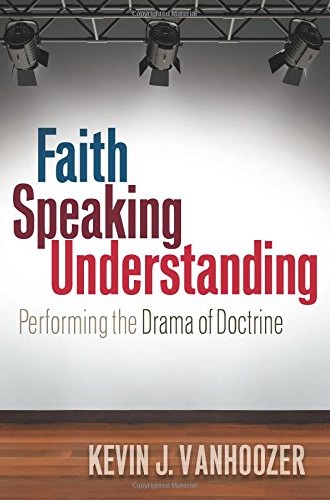Faith Speaking Understanding, by Kevin J. Vanhoozer
Kevin Vanhoozer demonstrates that Christian thought is a more engaging, embodied affair than much that passes for thinking these days.
The Christian faith is known, shared, and validated in its performance. The church exists not simply to guard or preserve orthodox doctrine but also to enact, embody, and incarnate doctrine. Kevin Vanhoozer, an experienced, highly regarded practical theologian, engagingly argues for the performance of Christian doctrine in Faith Speaking Understanding.
“Theology is the serious and joyful attempt to live blessedly with others, before God, in Christ, through the Spirit,” Vanhoozer writes. The book is his comprehensive call for Christians to actively join in “what God has done, is doing, and will do in Christ through the Spirit.” We can’t do church without doing doctrine, he contends; it’s not enough to correctly explain what we believe without living out those beliefs. Vanhoozer encourages lively engagement with and demonstration of the truth of our faith and offers criteria for knowing when we have succeeded in taking up our parts as actors in the divine/human drama that is Christ’s redemption of the world.
Read our latest issue or browse back issues.
Vanhoozer’s deep affection for the thought of the church is infectious and refreshing in an age that values a host of other things more than good thinking. A major strength of his book is its strong affirmation of the importance of church as more than a mere set of practices, with a concomitant downplay of the importance of beliefs and ideas. Some present Christianity as a culture in which convictions are not as significant as habits and general worldview. But Vanhoozer shows that one of the joys of the Christian faith is that we don’t have to make it up as we go; the saints can help us think our way toward discipleship as God means it to be. And what we think about God is decisive. We’ll never pull ourselves out of the morass of subjectivity and expressive individualism without some help from those who thought about the faith more deeply than we’re thinking now.
At the same time, Vanhoozer demonstrates that Christian thinking is a considerably more engaging, embodied affair than much that passes for thinking these days. Christians challenge the world’s ways of thought by doing what we know, by displaying lives and local churches that show the world something more than the world can produce by its philosophies, schemes, and political programs. The truth that is Jesus Christ is meant to be not only intellectually affirmed but also lived. As Augustine said in On Christian Doctrine, faithful scriptural interpretation does two things: it discovers what we need to learn, then “presents what we have learnt.”
Vanhoozer uses Kierkegaard’s analogy of the church as actors on the stage of the drama of salvation rather than a passive audience watching God perform. The gospel is a grand pageant performed by the Trinity, in which ordinary people are pushed onstage and given roles to play that we couldn’t have thought up ourselves. By the grace of God we are given not only the words to say but also the courage to overcome our stage fright. The Holy Spirit, says Vanhoozer, is the drama’s Director, Enabler, and Prompter.
Vanhoozer makes good use of Sam Wells’s Improvisation, extending and amplifying that improvisational depiction of Christian ethics. I found quite challenging his critique of mere story as a word to characterize the gospel. Drama is a more active, more involving way of telling and showing the good news of Jesus Christ. As a preacher I underlined Vanhoozer’s argument that there’s a difference between how one tells a story as a mode of discourse and how one presents the story as a drama.
My one disappointment with Faith Speaking Understanding is that Vanhoozer does not look at more specific doctrines through his lens of theodrama. After he makes his point that drama is to be performed, the book begins to feel redundant. I would have liked to see more doctrine displayed and less reiteration of the insights of performance theory. He takes an insightful look at hospitality (is that a doctrine or a practice?), and his discussion of the sacraments is rich. But what might it mean to turn the doctrine of reconciliation into drama? I’m surrounded by pastors who tell me that they are leading incarnational ministry, but I can’t tell for sure just how they are attempting to embody Christ’s incarnation—or whether we should even try such a thing.
I also think it would have been instructive for Vanhoozer to give us some examples of plays or movies that are good secular enactments of the dramatic dynamic he is advocating. I recently attended an incredible performance of Twelfth Night. While I read Faith Speaking Understanding, I constantly thought of the peculiar power of that play and the way those actors drew the audience into the performance.
Vanhoozer closes with a fine excursus on the historic Christian prejudice against the theater and actors; the church knew its stiffest competition when it saw it. Vanhoozer clearly thinks the church has a better play than what’s now on Broadway. Let’s get on stage, bring up the curtain, lose ourselves in the outrageous roles given to us by Christ, and sing and dance our hearts out before a disbelieving world.
Yesterday a layperson told me that she had taken up a challenge that I issued in my sermon last month. She was now attempting to share her faith with a Muslim coworker in her office. I thought not only of what a great preacher I can be with some help from the Holy Spirit, but also of Vanhoozer’s book. “What the church indwells and performs is not the script per se but rather the past, present, and future theodrama that the script transcribes, describes, and prescribes and anticipates.”






